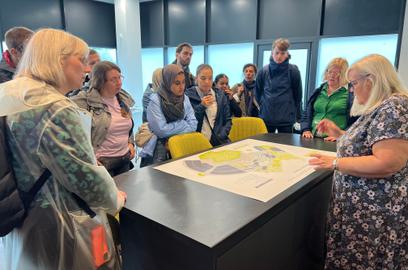An alternative planning scenario - a reflection
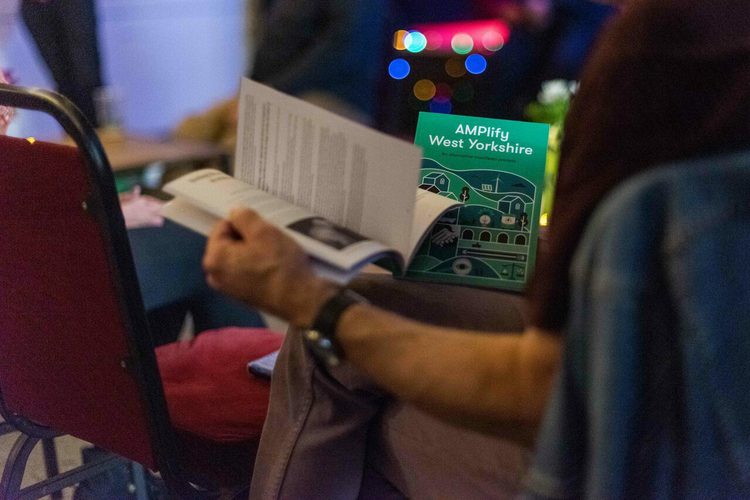
Neil spoke at the in-person RTPI Planning and Housing conference on 26th April 2022, talking about Community-led housing as a starting point for planning and alternative ways of approaching planning and plan-making through closer collaboration with the community and across geographic and administrative boundaries. Here's more about it and how it went.
I had the novel experience in April of organising and taking part in an IN-PERSON (!!) conference with RTPI Yorkshire and Same Skies – a citizen-led regional democracy think tank for West Yorkshire that I am involved in. It was so refreshing to speak to new people and make lateral connections between different pieces of work I am doing, professionally and personally, in a way that online discussions don’t lead to. I look forward to more of these in the future!
In this piece I summarise the main things I talked about at the conference and consider an alternative approach to planning for housing that focuses on citizen involvement and collaboration. The conference has also helpfully been summarised in full detail here here.
AMPlify West Yorkshire
As its main focus, the conference reflected on work undertaken by Same Skies in the run-up to the first West Yorkshire Mayoral election in May 2021, which was eventually won by Tracy Brabin giving us our first female metro Mayor. In 2020/2021 we curated ‘A(lternative)M(anifesto)P(rocess)lify West Yorkshire’, which brought together diverse perspectives not normally involved in formulating policy and strategy.
Through AMPlify we sought to understand the West Yorkshire devolution deal better; learned from other regional approaches to governance in Germany; hosted online discussions; met with groups and explored different areas of West Yorkshire through walking workshops; engaged in regular debate through smaller working groups and hosted an event that disrupted the usual format of a hustings where the candidates speak and, instead, brought together all mayoral candidates to listen to citizen-led organisations from across the region.
In total, more than 350 people took part in AMPlify in some way, contributing well over 700 hours of time. Eighteen writing groups were formed, totalling 50 people, resulting in a range of different pieces of a Manifesto that can all be read here.
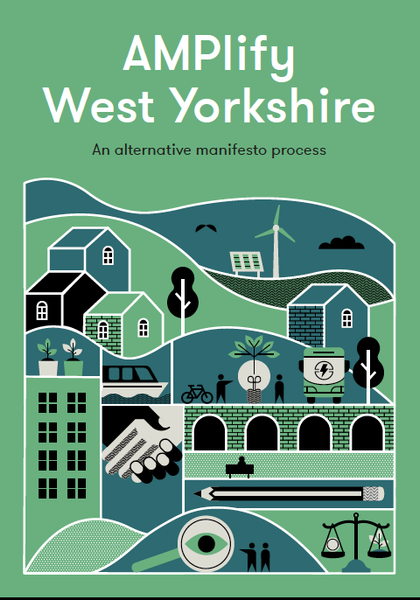
Planning and designing decent homes and liveable places for all in West Yorkshire
AMPlify asked different questions to see what the outcome was, starting conversations to collectively define a sense of purpose. I co-authored a piece that explored what it would mean to ‘plan and design decent and affordable homes for everyone in West Yorkshire’.
To this question, a friend responded with the illustrated graphic below, touching on what our cities, buildings and streets are for in the context of a global pandemic and the unfolding climate emergency.
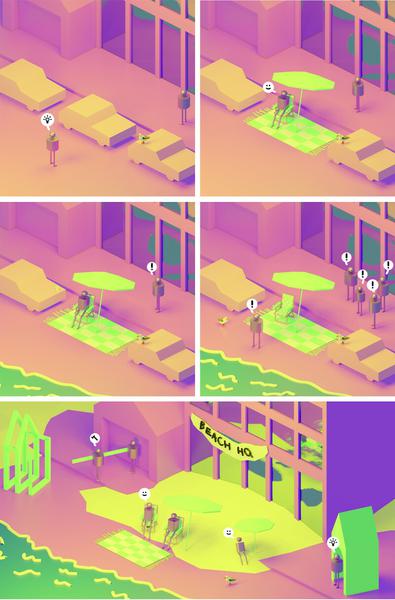
Some of the key problems we were addressing were the nature of housing provision, the level of control we have over this process and the quality of the outcomes we currently get from this system, both in terms of physical buildings but also the social/economic/environmental inequalities perpetuated. Related to this, it was also addressing a fundamental mischaracterisation of NIMBYism - I strongly believe people react to housing proposals quite negatively because they don’t want rubbish housing and will use whatever means possible to express this in the face of limited power and control.
The key messages of the manifesto for an alternative planning scenario were:
- Change the ground rules and tell a new story together - take the opportunity of devolution as a chance to do something bold and imaginative, to experiment with change often not possible at a national level. This shouldn’t just be led by the Mayor or Local Authorities but must be done collaboratively.
- Think of strategy and policy making as collective learning - the process of how you define and agree a new story is fundamentally important to the outcomes. The Mayor and Local Authorities should be humble and admit they are not experts, whilst playing a fundamental strategic role in convening discussions and in providing services (including direct delivery of housing). Policy should be co-produced when possible, recognising the knowledge and skills and action of the citizens of West Yorkshire who are already doing brilliant things.
- Move away from generalised numbers and establish housing as a right, responding to specific needs - planning for housing needs to move away from a reductive and generalised growth narrative, where people cite the so many hundreds of thousands of homes needed. We need to foster a housing system that knows who the end user will be, that is much more responsive and reflective of actual differentiated need and circumstances of people, rather than one that is speculative and led by volume housebuilders.
- Housing and placemaking - housing is not simply about physical buildings or 'units’ but is about our neighbourhoods and our wellbeing. A wider range of people beyond those who can own a home need to be empowered to be in control and shape their housing over time. We also particularly need to work out ways of improving our existing homes and neighbourhoods, and not just rely on new development and extracting s106 / CIL contributions to spend elsewhere.
- Public/civic power in a new regional planning and housing system - there is an opportunity for local authorities and regional authorities to take a leading role in addressing current shortcomings of the system. This would involve an increase in public/civic land ownership, more public and community led housing provision (including buy-backs of existing and building new homes), so as to drive up the quality of outcomes.
An alternative planning scenario?
What AMPlify represents is a different way of crowdsourcing and drawing on the expertise and knowledge of people across the region, recognising that there are glimmers of hope that can be nurtured and expanded upon. The process highlighted there are lots of people that want to engage in planning discussions if the structures and support were there. People want to be involved not just at the stage of responding to a development proposal (call them ‘NIMBYs’, if you like) but in shaping the very purpose of why we plan and design, and setting the strategic direction for an area. The process also captured a certain level of aspiration by starting open conversations and establishing a ‘purpose’.
AMPlify was grounded in the idea that small ideas are incredibly valuable, that experimentation and working with practical prototypes is important and doesn’t stand at odds with strategic coordination. Planning doesn’t need to consider and cover everything - what is more important is to provide overarching direction and then to collaborate widely and involve voices often ignored, building up from this foundation.
The language that emerged from AMPlify was very different from the generic platitudes you see in visions statements for Local Plans and other policy documents about growing and competitive places. If implemented, the ideas in AMPlify would inform the evolution of a different story for West Yorkshire, one that is truly unique and grounded in the places and people who live there.
Examples such as RTPI and IPPR North’s work on the ‘Blueprint for a Great North Plan’, as well as Tibbalds work with York on their Housing Delivery Programme are examples of such an alternative planning scenario emerging at different scales and could be expanded upon based on the ideas contained in AMPlify.
I found AMPlify a heartening process and something to be proud of having been a part. Based on the discussions at the conference it also seems that others are also excited by the prospect of taking a different approach. I admit a lot would have to change for the alternative planning scenario outlined above to become the norm, however that won’t stop me from hoping. There are lots of ideas and examples cited above and in the manifesto to take this from!
-
Header image credit to Same Skies Think Tank
Related Updates

Lizzie Le Mare speaking at the Housing Finance Conference 2025

Tibbalds
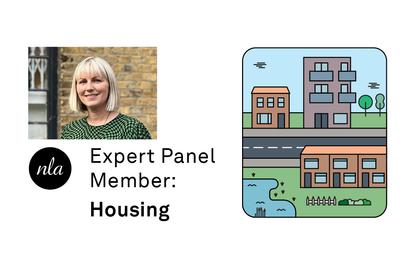
Lizzie Le Mare joins NLA Expert Panel

Tibbalds
Stay In Touch
Sign up to our Newsletter
Subscribe to our newsletter to receive updates about making people friendly places.

